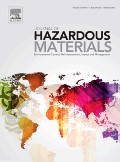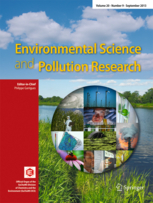Special Issue on Journal of Hazardous Materials (Elsevier)
Elsevier, the publisher of the Journal Hazardous Materials (IF: 4.863), are delighted to announce their support for the 2nd PTIM to be held in Portugal, Aldeia dos Capuchos, Caparica in 2017.
A special Congress Issue of the journal will be produced and will contain contributions from selected invited contributors to the congress.
The collection of these innovative papers will focused on: New Toxic Emerging Contaminants
As the Guest Editors of this collection of papers, We are inviting you to contribute a paper on your current research activities in your area of expertise. The special issue will feature full-length research papers, critical reviews, and case studies.
The submission deadline for papers has been set at 01 March 2018: All papers should be submitted before this date and the option to submit online via the submission system (EES) will closed.
- Acceptance deadline: 01 July 2018: All manuscripts must be peer reviewed and final decisions (accept or reject) made for all articles by this date.
- Earlier submissions are encouraged, and papers will be published online as soon as they have been accepted for publication.
All invited papers will be subject to the same rigorous peer-review process as regular submissions to the journal, and upon publication each author team will be provided with a free pdf file of the printed article. Prof. Diana Aga (JHM Editor in chief) would be the oversee editor for this special issue.
You may also find the EES Interactive Tutorials a useful resource: https://www.elsevier.com/editors/elsevier-editorial-system
It is important that authors select the correct article type when they submit their articles in EES. When submitting your papers, authors must select SI:II PTIM 2017 as the article type.
The submission portal of HAZMAT is: http://ees.elsevier.com/hazmat/
We would very much appreciate your participation in this special issue, and hope that you are able to accept this invitation.
Guest Editors: Prof. Dr. Carlos Lodeiro, Prof. Dr. José Luis Capelo, Dr. Elisabete Oliveira and Mr. Adrián Fernández-Lodeiro.
Special Issue on Environmental Science and Pollution Research (ESPR) Springer
Springer, the publisher of the International Journal Environmental Science and Pollution Research (IF: 2.760) are delighted to announce their support for the 2nd PTIM to be held in Portugal in 2017.
A special Congress Issue of the journal will be produced and will contain contributions from selected invited contributors to the congress.
The collection of these innovative papers will focused on: Beyond the Toxicological effects
As the Guest Editors of this collection of papers, We are inviting you to contribute a paper on your current research activities in your area of expertise. The special issue will feature both critical reviews and research papers. Here are some further details on the different paper types. A review is expected to present a critical overview of the state-of-the-art of a topic, with critically selected examples (not only from your own work), to point the reader to trends and likely future developments and to give a selection of important references to the current literature. As a guideline, for a critical review the manuscript is expected to be around 35 000 characters in length, plus figures and tables. For a research paper, paper length must be appropriate to content. There is no strict page limit. You will find the journal’s instructions for authors on the ESPR homepage at http://www.springer.com/environment/journal/11356.
Furthermore, I am pleased to announce that color figures will be printed in color free-of-charge to the author, both in the online and print versions of the journal.
The submission deadline for papers has been set as 1st March 2018. Earlier submissions are encouraged, and papers will be published online as soon as they have been accepted for publication. During the submission please use the article type SI: PTIM2017
All invited papers will be subject to the same rigorous peer-review process as regular submissions to the journal, and upon publication each author team will be provided with a free pdf file of the printed article. We ask that you submit your manuscript directly to the ESPR editorial office by online submission at http://www.editorialmanager.com/espr/.
We would very much appreciate your participation in this special issue and hope that you are able to accept this invitation.
Guest Editors: Prof. Dr. Carlos Lodeiro, Prof. Dr. José Luis Capelo and Dr. Elisabete Oliveira.





